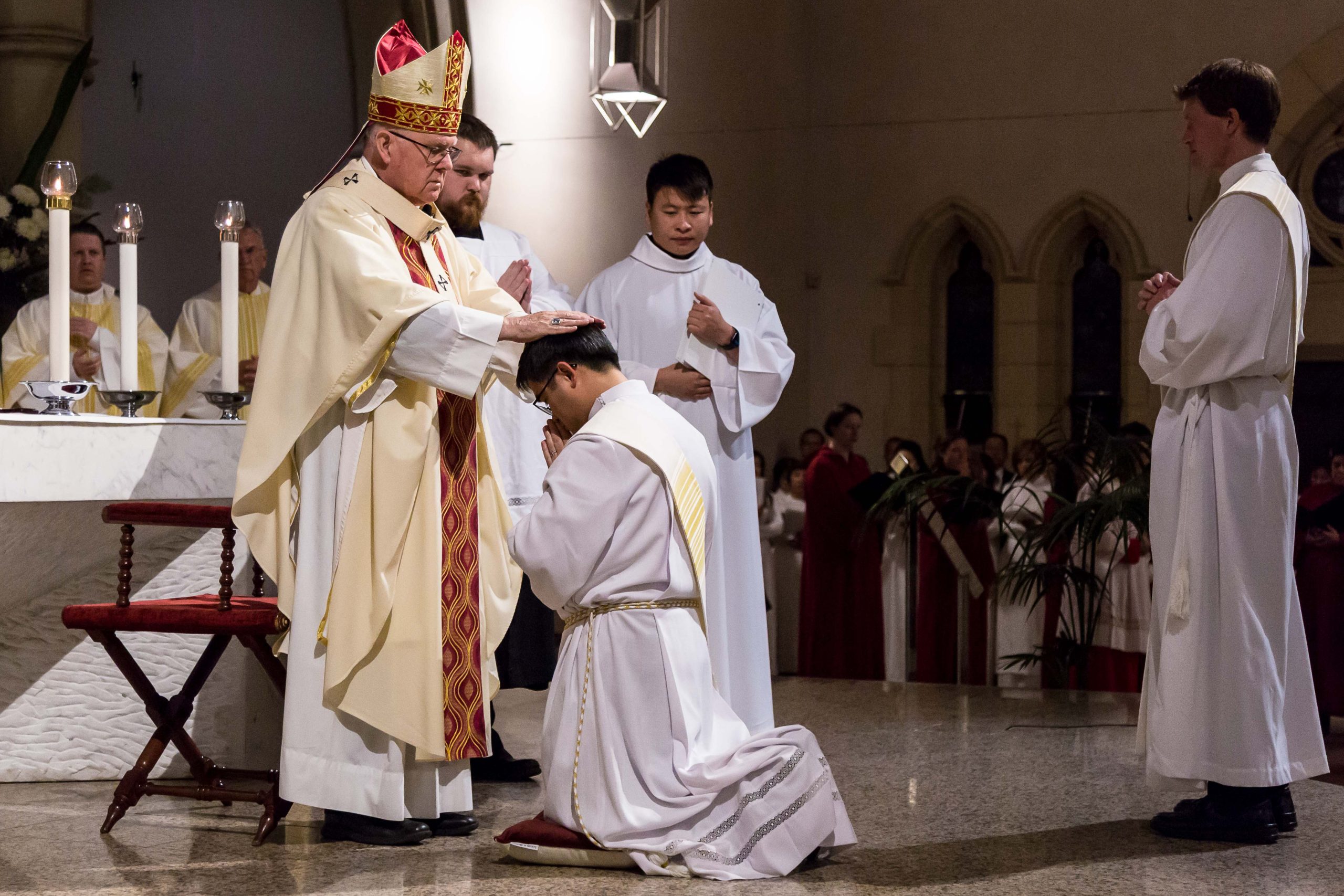Holy Orders or Ordination gives the ordained person a sacred power in the name and authority of Christ and through the Holy Spirit, to serve the people of God.
There are three different orders or dimensions of ordination in the Catholic Church: bishop, priest and deacon.
In the Roman Catholic Church, bishops and priests take a vow of celibacy at their ordination. Married men may be ordained as deacons.
In the ordination ceremony, the bishop places his hands on the head of the person being ordained and prays that God will give him the special gifts of the Holy Spirit needed to carry out his ministry.
Bishop
The bishop, who has the fullest of orders, has a three-fold ministry of prophet, priest and shepherd.
As a prophet, the bishop speaks for God or on behalf of God.
In his priestly role, the bishop has responsibility for the proper celebration of the liturgy and the sacraments in his diocese.
As a shepherd, the bishop cares for all people in the diocese where he is appointed to serve, especially the poor and the suffering. The bishop’s staff (the crosier) symbolises his role as spiritual shepherd of his flock.
Priest
A priest shares in the ministry of the bishop. The main roles of the priest are preaching, celebrating the sacraments and leadership for building up the community of the church. The priest is called to serve his people in word and in sacrament and by leadership after the model of our Lord.
Becoming a priest
The Catholic priesthood is the second of the three ordained ministries of the Sacrament of Holy Orders. The others are diaconate (for deacons) and episcopate (for bishops).
The Order of Priesthood gives the ordained person the office of offering the Body and Blood of Christ in the Eucharist and of forgiving sins in the Sacrament of Reconciliation. In and through the exercise of these ministries the ordained priest is further charged with celebrating the sacraments of Baptism, Matrimony and Anointing of the Sick.
Priesthood also embraces the exercise of spiritual leadership, the teaching of faith and morals, formation of lay leaders and whatever other duties are deemed necessary by his bishop or religious superior.
Priesthood requires holiness of life, moral integrity, and celibacy.
Deacon
A deacon is ordained to serve the Church through ministry of word, worship, pastoral care and charity. A deacon may baptise, preach, officiate at marriages and funerals but cannot preside at Eucharist or give absolution.
Before someone is ordained a priest, he is first ordained as a deacon. There are also ‘permanent’ deacons who have been ordained and function as deacons who will not be ordained to the priesthood.
Life of the Deacon
Deacons serve as the bishop directs. This may be in a parish, or anywhere the bishop discerns a need. Deacons are called to carry Christ and the gospel to their workplaces, places of relaxation and to the heart of their family life.
The work of the deacon has been described as being commissioned by the bishop to discern the needs of people, and bringing back word of need to the diocesan and/or parish community. Deacons were in early times referred to as “the eyes and ears” of the bishop.
The Permanent Diaconate is an ordained ministry, but the deacon is not a substitute priest and cannot preside at the celebration of the Eucharist. Nor is he a pastoral associate. Deacons are not in competition with lay ministers, including those in leadership positions.
Diaconal ministry should be in harmony with the ministry of ordained priests and lay leaders. Part of the deacon’s role is to promote and support the apostolic activities of the laity.
Since the Second Vatican Council, Catholic teaching has emphasised a balanced diaconal ministry of preaching and sacramental ministry.
Becoming a deacon
It is the responsibility of the diocesan bishop to discern a vocation to the diaconate. To be a suitable candidate for ordination, a person must:
- be a Catholic man of sound moral character and mature faith, who has demonstrated a sense of vocation to service,
- demonstrate prayerfulness and an openness to further spiritual formation,
- be at least 35 years of age at the time of ordination, and should not normally be older than the commonly accepted retirement age,
- have adequate physical and mental health, and
- have the support of their parish priest.
Those wishing to become a deacon should also have the ability to complete undergraduate studies and be able to make time for formation without detriment to their family and work commitments.
